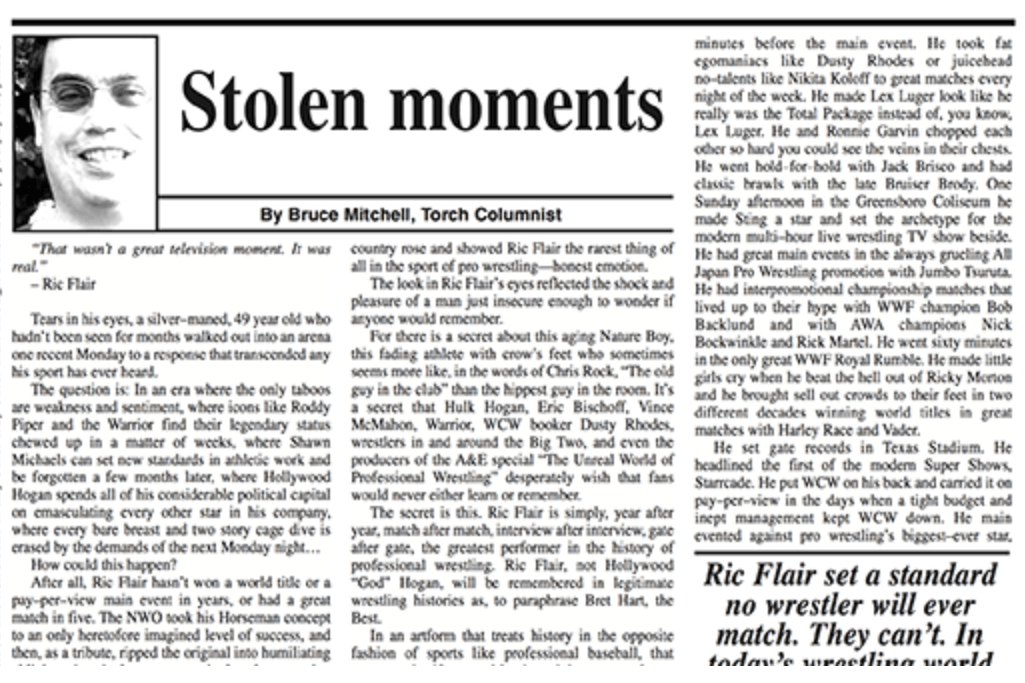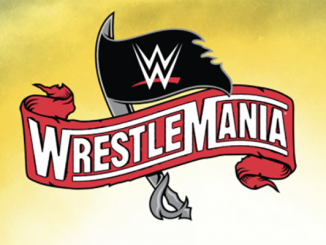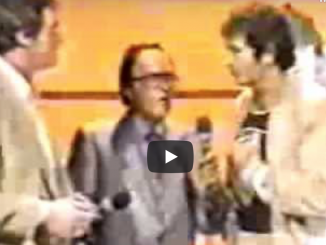
SPOTLIGHTED PODCAST ALERT (YOUR ARTICLE BEGINS A FEW INCHES DOWN)...
This month marks the 25th Anniversary of Bruce Mitchell becoming a Pro Wrestling Torch Newsletter columnist. No single person has influenced the editorial tone and direction of the Torch brand over the years than Bruce, who brought a hard-hitting, supremely well-informed, speak-truth-to-power approach to his writing. He went after sacred cows out of the gate, such as the beloved among “smart fans” (today’s “Internet fans” or “IWC,” I suppose) Eddie Gilbert and Jim Cornette. He also went hard after people in positions of authority and power who were abusing or misusing that power, or just not delivering a worthy product. He has also applauded and paid tribute to the greatest moments and movements in pro wrestling over the last 25 years, with a style of writing that has yet to be matched anywhere, I contend (despite Bill Simmons’s arrogant and uninformed contention last year that no one wrote at a high level about pro wrestling until his “Masked Man” columnist came along).
To celebrate and highlight Bruce’s stellar 25 years of influential and eloquent truth-telling about this fascinating industry, we’ll be featuring a single column from each of the last 25 years each of the first 25 days this month. His long-form columns were a pioneer approach to pro wrestling journalism, and the next 25 years you’ll experience a slice of what it is that has earned Bruce Mitchell widespread recognition within the industry over the years as being “Pro Wrestling’s Most Respected Columnist.” We began on Oct. 1st with his very first column, from Pro Wrestling Torch Newsletter #89 (cover dated Oct. 5, 1990).
Today we feature his column from the October 10, 1998 detailing why Ric Flair should be regarded as the Greatest of All-Time and how he was having to navigate within the political turmoil of the WCW Nitro locker room at the time.
NOTE: VIP members can access hundreds of Mitchell columns instantly in the BRUCE MITCHELL LIBRARY here, part of the massive unmatched online archives of insider wrestling coverage from over the past 28 years.
===
“Stolen Moments”
By Bruce Mitchell, Torch columnist
Originally published: October 10, 1998
Pro Wrestling Torch Weekly newsletter #515
“That wasn’t a great television moment. It was real.”
-Ric Flair
Tears in his eyes, a silver-maned, 49 year old who hadn’t been seen for months walked out into an arena one recent Monday to a response that transcended any his sport has ever heard.
The question is: In an era where the only taboos are weakness and sentiment, where icons like Roddy Piper and the Warrior find their legendary status chewed up in a matter of weeks, where Shawn Michaels can set new standards in athletic work and be forgotten a few months later, where Hollywood Hogan spends all of his considerable political capital on emasculating every other star in his company, where every bare breast and two story cage dive is erased by the demands of the next Monday night…
How could this happen?
After all, Ric Flair hasn’t won a world title or a pay-per-view main event in years, or had a great match in five. The NWO took his Horseman concept to an only heretofore imagined level of success, and then, as a tribute, ripped the original into humiliating oblivion. Arn Anderson was retired, only appearing on the air when the promotion wanted to hint that he, not Flair, was the heart of the Horsemen. Most weeks the only wrestler holding up four fingers was the inept Mongo McMichael.
And Flair? After months of by-the-numbers interviews Flair got motivated enough to spark his Bret Hart match to a surprising buyrate. As thanks, Eric Bischoff aborted the feud and sued Ric Flair for breach of contract a few weeks later for missing a Thunder taping and attending his son’s national AAU wrestling meet.
Which reminds me. Has Kevin Nash done that job to the Giant yet? You know, the one he kept dodging on pay-per-view last year? Anyone sue Goldberg for breach when he missed that show and WCW had to give back a hundred thousand dollar house?
More to the point, is WCW going to do anything about Scott Hall, besides laugh at him on television, before he drives drunk and kills somebody?
Not when he could probably go to work for Vince with a house-arrest beeper strapped around his leg.
Now it may be that Ric Flair didn’t tell WCW, as he was contractually obligated, about his night off. Flair is very much the politician who tells his constituency what they want to hear at every moment.
In this era of “What have you done for me now, forget lately?” most fans neither know nor care whether Ric Flair was treated fairly.
None of which explains what happened in Greenville, S.C. that night. By all rights and every rule of the modern “Suck It” wrestling boom Ric Flair should not have meant much to either the live crowd or the television audience.
Instead people in Greenville, and people on couches and in bars and bowling alleys around this country rose and showed Ric Flair the rarest thing of all in the sport of pro wrestling – honest emotion.
The look in Ric Flair’s eyes reflected the shock and pleasure of a man just insecure enough to wonder if anyone would remember.
For there is a secret about this aging Nature Boy, this fading athlete with crow’s feet who sometimes seems more like, in the words of Chris Rock, “The old guy in the club” than the hippest guy in the room. It’s a secret that Hulk Hogan, Eric Bischoff, Vince McMahon, Warrior, WCW booker Dusty Rhodes, wrestlers in and around the Big Two, and even the producers of the A&E special “The Unreal World of Professional Wrestling” desperately wish that fans would never either learn or remember.
The secret is this. Ric Flair is simply, year after year, match after match, interview after interview, gate after gate, the greatest performer in the history of professional wrestling. Ric Flair, not Hollywood “God” Hogan, will be remembered in legitimate wrestling histories as, to paraphrase Bret Hart, the Best.
In an art form that treats history in the opposite fashion of sports like professional baseball, that recreates itself every Monday night, some of you might not know that for over ten years (not a generation in the wrestling business, but several) Ric Flair set a standard for great work that no one in this business will ever equal. Three hundred nights a year, all over the world, in every city and burg and hamlet that claimed a wrestling fan, in stadiums and coliseums and civic centers and high school gyms and television studios, Ric Flair put on four star or better (and many times much better) matches with every name wrestler of the era.
The following is just a partial list of wrestlers who Ric Flair had great matches with: Hulk Hogan, Dusty Rhodes, Lex Luger, Sting, Antonio Inoki, Randy Savage, Bret Hart, Brian Pillman, Harley Race, Ricky Morton, Rick Martel, Roddy Piper, Kerry Von Erich, David Von Erich, Vader, Nikita Koloff, Paul Orndorff, Junkyard Dog, Tommy Rich, Ronnie Garvin, Bobby Eaton, Greg Valentine, Bob Backlund, Barry Windham, Dick Murdoch, Ted DiBiase, Eddie Gilbert, Magnum T.A., Terry Taylor, Jimmy Snuka. Many if not most, of the wrestlers had their career best matches against Flair.
Oh, you didn’t know?
Flair was so good he had series that set the five-star standard for wrestling worked three different times in two different decades with his all-time greatest opponent Ricky Steamboat. He had arguably the greatest live television match ever with Sting, then he had it with Steamboat, and then with Terry Funk. He was so good he could carry the late Kerry Von Erich to five-star, sixty minute draws.
Hell, he was so good he could carry an unconscious Kerry to a sixty minute draw, like that night he had to do just that when they found the Not So Modern Day Scott Hall passed out in his car fifteen minutes before the main event. He took fat egomaniacs like Dusty Rhodes or juicehead no-talents like Nikita Koloff to great matches every night of the week. He made Lex Luger look like he really was the Total Package instead of, you know, Lex Luger. He and Ronnie Garvin chopped each other so hard you could see the veins in their chests. He went hold-for-hold with Jack Brisco and had classic brawls with the late Bruiser Brody. One Sunday afternoon in the Greensboro Coliseum he made Sting a star and set the archetype for the modern multi-hour live wrestling TV show beside. He had great main events in the always grueling All Japan Pro Wrestling promotion with Jumbo Tsuruta. He had interpromotional championship matches that lived up to their hype with WWF champion Bob Backlund and with AWA champions Nick Bockwinkle and Rick Martel. He went sixty minutes in the only great WWF Royal Rumble. He made little girls cry when he beat the hell out of Ricky Morton and he brought sell out crowds to their feet in two different decades winning world titles in great matches with Harley Race and Vader.
He set gate records in Texas Stadium. He headlined the first of the modern Super Shows, Starrcade. He put WCW on his back and carried it on pay-per-view in the days when a tight budget and inept management kept WCW down. He main evented against pro wrestling’s biggest-ever star, Antonio Inoki, in front of the largest live crowd to ever see a wrestling match.
He made it so that no matter how big your pythons were, or how many cartoons or dolls or bad movies or Wrestlemanias you sold, or undefeated Giants you slammed and pinned, there was always going to be some smart ass in the airport telling you that “Ric Flair could kick your ass.” And if you were a fan in Greenville S.C. or Norfolk Va. or Raleigh, N.C. or Johnson City, Tenn. or Atlanta, Ga. or Greensboro, N.C. or Charlotte, N.C. you knew the wrestling show would be good because Ric Flair was in the main event. There is no great wrestler, not Shawn Michaels or Bret Hart or Ultimo Dragon or Terry Funk or Jushin Liger or Manami Toyota or Kenta Kobashi or Rey Misterio Jr. who always made an effort to have a great, not just a good match every time he stepped in the ring, no matter the opponent. Ric Flair set a standard no wrestler will ever match.
They can’t. It’s impossible. In today’s wrestling world the best wrestlers simply can’t last at the top of their form for more than five years before injuries rob them of their ability. Wrestlers can’t afford to put their best out unless the cameras are rolling.
Shawn Michaels only had his great matches every six weeks or so on pay-per-view. At age 33 his days of great wrestling work may already be over. Jushin Liger, Shinya Hashimoto, Mitsuhara Mitsawa, and Kenta Kobashi only really turn it on for the big shows. The physical toll is already beginning to show on these wrestlers, all of whom are only in their mid-30s. Ultimo Dragon, perhaps the best worker in the business, finds his career in jeopardy while only in his 20s.
Ric Flair was the best in the business, night in and night out, for ten years.
And he threw in the best interviews on television in the bargain.
Now, Flair might also have thrown three dropkicks in his entire career, all pitiful, and he probably thinks a pescado is another name for margarita, and well, some of his matches were sorta like some of his other matches. Who could forget the run into the turnbuckle, followed by the flip n’ fall or the world’s slowest climb to the turnbuckle?
But he made an artform of the two and three quarter kick out, made a simple chop the most exciting move in the game (so much so that fans “Whoo” in tribute at every slap), and built his matches so fans usually thought both wrestlers were champs – Flair because, well, he usually was the champ and the other guy because Flair sold most of the match for him.
And therein lies both the problem and the key to why fans react the way they do, despite Eric Bischoff’s and Hulk Hogan’s best efforts. With the exception of six months in 1989 when a babyface Flair feuded with Terry Funk on top and drew sellouts for a company that couldn’t even spell its own wrestlers’ names right, for my money the only time Ric Flair has ever really been promoted right was for about three years in the late-’70s and early-’80s. During that time Flair, not Dusty Rhodes, or Sting, or Lex Luger, or Hulk Hogan, was pushed as the top star in the Mid-Atlantic promotion as the babyface U.S. Champion against Jimmy Snuka (w/Buddy Rogers), Greg Valentine, and Roddy Piper.
Then came the NWA Title and a sallow-faced fat boy with enough charisma and smarts to ride Ric Flair to the most lucrative run of his career and to become the only booker to make a competitive run at the then Walt Disney of wrestling, Vince McMahon. Dusty Rhodes paid Flair back for his hard work in 1988 when he told TBS executives “We don’t need him.”
Ahh, the good ol’ days.
The next boss, Jim Herd, was so incompetent he thought Lex Luger could make fans forget Flair (I know it seems preposterous today to think that Lex Luger could make anyone forget Ahmed Johnson, much less the Nature Boy, but back in those days it almost seemed reasonable) and let Flair traipse off to the WWF, championship belt in tow, originating the now famous chant “We want Flair.” Actually this was the time WCW averaged 1,500 people at house shows that Bischoff keeps bringing up. Bischoff, like Hogan and McMahon, has his own fantasy about how he created modern pro wrestling and it too has no room for Flair.
And, of course, Hulk Hogan – who despite his game, power, and hours of TV face time knows in his heart of hearts that he’ll never get the response and respect Ric Flair received that night in Greenville – has beaten him for his title, beaten him in every arena in the country, beaten him for his career, beaten him in his home arena at War Games, kept him off TV, and let other wrestlers humiliate him.
Flair’s flaw has always been his “Get along to go along” style of politics, his inability to see the screw coming, take the hard stand, and do something about it. It’s too late now. Wrestling fans know that the greatest performer in the sport is constantly cut off, that they are constantly denied the guy the way they, not the promotion, want to see him. Paradoxically all the attempts to kill off Ric Flair over the years have added to the emotion of that moment in Greenville. If WCW doesn’t want it, the fans will make it happen anyway.
The Nitro moment was one of the most emotional in the sport’s history, because “It was real,” right up until Eric Bischoff walked out and Flair started yelling “Abuse of power” at him.
Whether or not Flair was supposed to call Bischoff an “Asshole,” it then became just another worked shoot angle. Ric Flair is back working with those who want to cut him down to size, just like always.
While some in the locker room seem surprised with how little civility Bischoff treats Flair and some think the jealousy must be a work after all this time, Flair chose to come back to WCW only because, at this stage of the game, he’s a businessman and he’ll make more money there. If that money is right Flair will go along, reluctantly, with Bischoff and Hogan’s attempts to strip him of his respect. If he lets Bischoff wrestle him in a match where he sells a middle-aged wanna-be wrestler’s moves the way he sold everyone else’s over the years Flair may actually find himself irrelevant.
Like Bret Hart, Sting, and the rest – irrelevant and well paid.
And for all of his Hulkean efforts Hogan finds himself getting that “You suck!” booing again, his hand-picked, million-dollar babyface opponent laughed at before the remote gets flipped, and his boyfriend, I mean, his best friend, getting booed despite his key babyface turn. Ric Flair’s best friend, the retired guy with one arm, keeps winning the quarter hour ratings.
Sadly, Flair and the Horsemen are going to have to deal with the consequences of an angry, insecure Hollywood Hogan. Because no matter how much Hulk Hogan, Eric Bischoff, and Vince McMahon want to be Masters of Reality fans who have watched wrestling for years – Ric Flair fans – know the truth. They know it’s their job to steal Ric Flair, Arn Anderson, and themselves another great moment.
Because sooner rather than later (like last week) Bischoff and Hogan are going to schedule a Horsemen segment in the middle of the second hour, with no buildup, and then cut off Flair thirty seconds into the interview, guaranteeing a bad quarter hour rating so they can say “I told you so” and fool themselves that Hulk Hogan is anything more than a fading gate attraction.
Until the next time Ric Flair, Arn Anderson, and wrestling fans around the country can steal another moment for the ages.
END COLUMN
CHECK OUT PREVIOUS YEARS’ SELECTIONS OF BRUCE MITCHELL COLUMNS OVER THE LAST 25 YEARS: CLICK HERE




Leave a Reply
You must be logged in to post a comment.